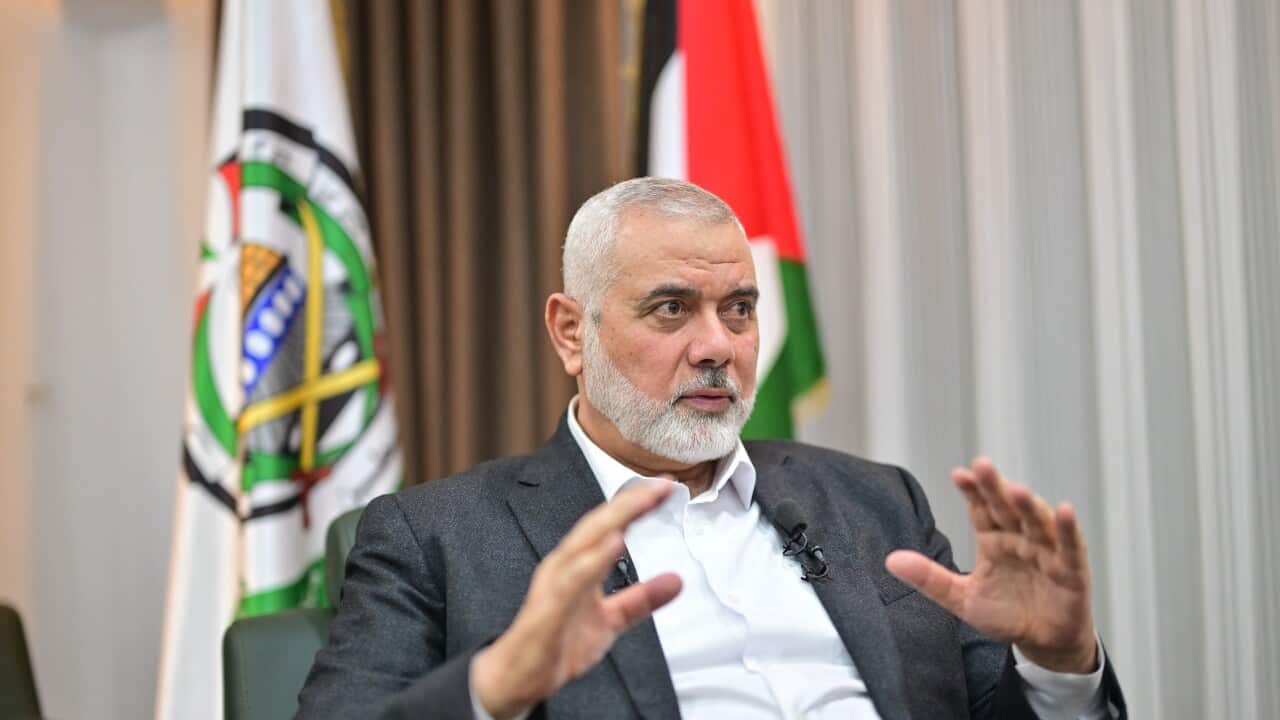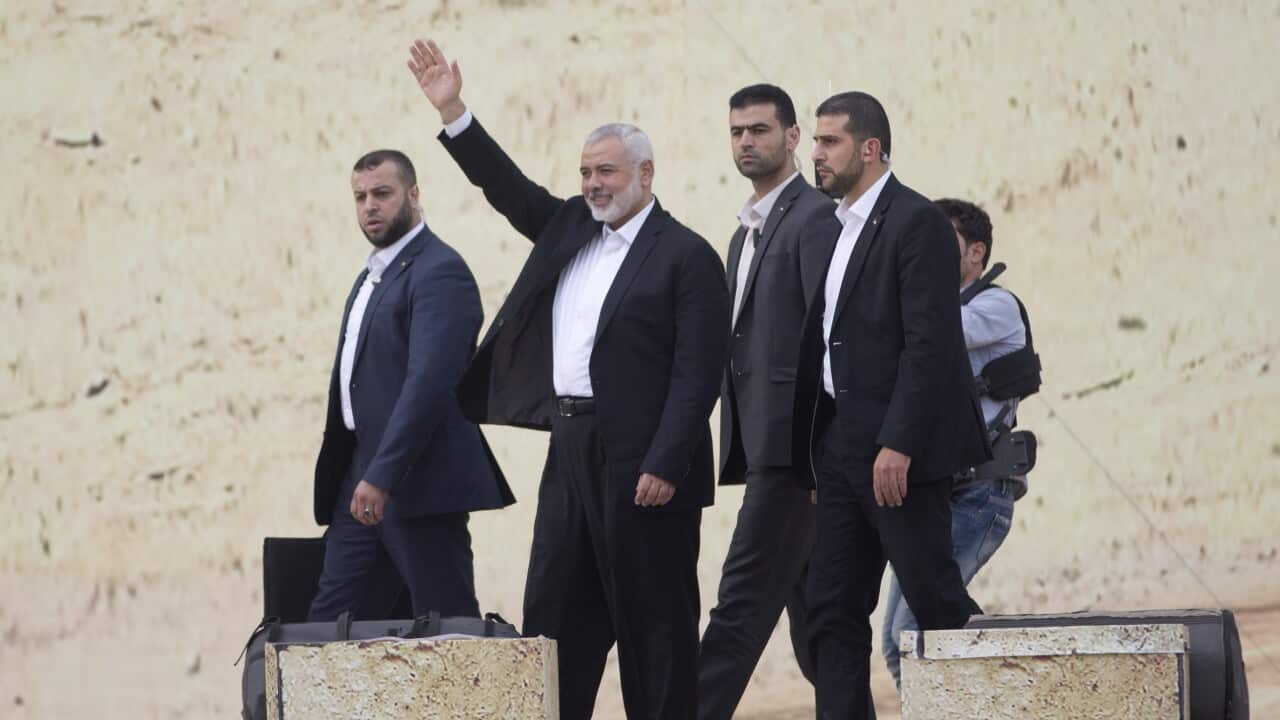Key Points
- Hamas political leader Ismail Haniyeh has reportedly been killed in Iran.
- Haniyeh was an early advocate of Hamas forming a political party.
- He'd been living outside of Gaza in exile, as the war which took the lives of three of his sons raged in enclave.
In what many see as a major development in the nearly 10-month-long war in Gaza, the Palestinian group Hamas says its political leader has been killed.
Ismail Haniyeh, who had been living in exile outside of Gaza for about five years, in a raid on his residence in the Iranian capital.
So, who was he and what role did Haniyeh have in the ongoing conflict with Israel?
Political leader
Haniyeh served as the Palestinian prime minister after Hamas won parliamentary elections in 2006 — a year before the Islamic militant group seized control of Gaza from the rival Fatah-led forces of President Mahmoud Abbas.
He served as Hamas' political leader in the group's Gaza stronghold before being elected as chairman of Hamas' political bureau in 2017.
He left Gaza shortly afterwards and moved between Türkiye and Qatar's capital Doha, escaping the travel curbs of the blockaded Gaza Strip.

While in exile, Ismail Haniyeh spent his time between Türkiye — where he is pictured here with Turkish President Recep Tayyip Erdoğan — and Qatar. Source: Getty / Anadolu
"Haniyeh is leading the political battle for Hamas with Arab governments," Adeeb Ziadeh, a specialist in Palestinian affairs at Qatar University, said before his death, adding that he had close ties with more hard-line figures in the group and the military wing.
"He is the political and diplomatic front of Hamas," Ziadeh said.
Haniyeh had met officials in Egypt, which has also had a mediation role in the ceasefire talks.
He was understood to have been part of talks as part of a Qatari-brokered ceasefire deal with Israel to exchange hostages for Palestinians in Israeli jails as well as more aid for Gaza.
October 7 attack
Israel regards the entire Hamas leadership as terrorists, and has accused Haniyeh and others of continuing to "pull the strings of the Hamas terror organisation".
But how much Haniyeh knew about the October 7 attack on Israel beforehand is not clear.
The plan, drawn up by the Hamas military council in Gaza, was such a closely guarded secret that some Hamas officials seemed shocked by its timing and scale.
Yet Haniyeh, a Sunni Muslim, had a major hand in building up Hamas' fighting capacity, partly by nurturing ties with Shi'ite Muslim Iran, which makes no secret of its support for the group.
During the decade in which Haniyeh was Hamas' top leader in Gaza, Israel accused his leadership team of helping to divert humanitarian aid to the group's military wing, something Hamas denied.

Haniyeh was reportedly killed in the Iranian capital of Tehran.
A tough-talking 'moderate'
Haniyeh was the tough-talking face of the Palestinian group's international diplomacy as war raged back in Gaza.
"All the agreements of normalisation that you (Arab states) signed with (Israel) will not end this conflict," Haniyeh declared on Qatar-based Al Jazeera television shortly after Hamas fighters launched the October 7 raid.
But despite the rhetoric, he was seen by many diplomats as a moderate compared to the more hard-line members of the Iran-backed group inside Gaza.
Hamas, Haniyeh and politics
As a young man, Haniyeh was a student activist at the Islamic University in Gaza City.
He joined Hamas when it was created in the First Palestinian Intifada (uprising) in 1987.
After being arrested and briefly deported, Haniyeh became a protégé of Hamas founder Sheikh Ahmed Yassin.
He became a trusted aide to him before Yassin was assassinated by Israel in 2004.
Haniyeh was an early advocate of Hamas entering politics despite the idea initially being overruled by Hamas leadership at the time.
In 1994, he said that forming a political party "would enable Hamas to deal with emerging developments".
In 2012, when asked by reporters from the Reuters news agency if Hamas had abandoned the armed struggle, Haniyeh replied "of course not" and said resistance would continue "in all forms — popular resistance, political, diplomatic and military resistance".
Haniyeh's sons
Three of Haniyeh's sons — Hazem, Amir and Mohammad — were killed on 10 April when an Israeli airstrike hit the car they were driving, Hamas said.
Haniyeh also lost four of his grandchildren, three girls and a boy, in the attack, Hamas said.
The political leader had denied Israeli assertions that his sons were fighters for the group, and said "the interests of the Palestinian people are placed ahead of everything" when asked if their killing would impact truce talks.












